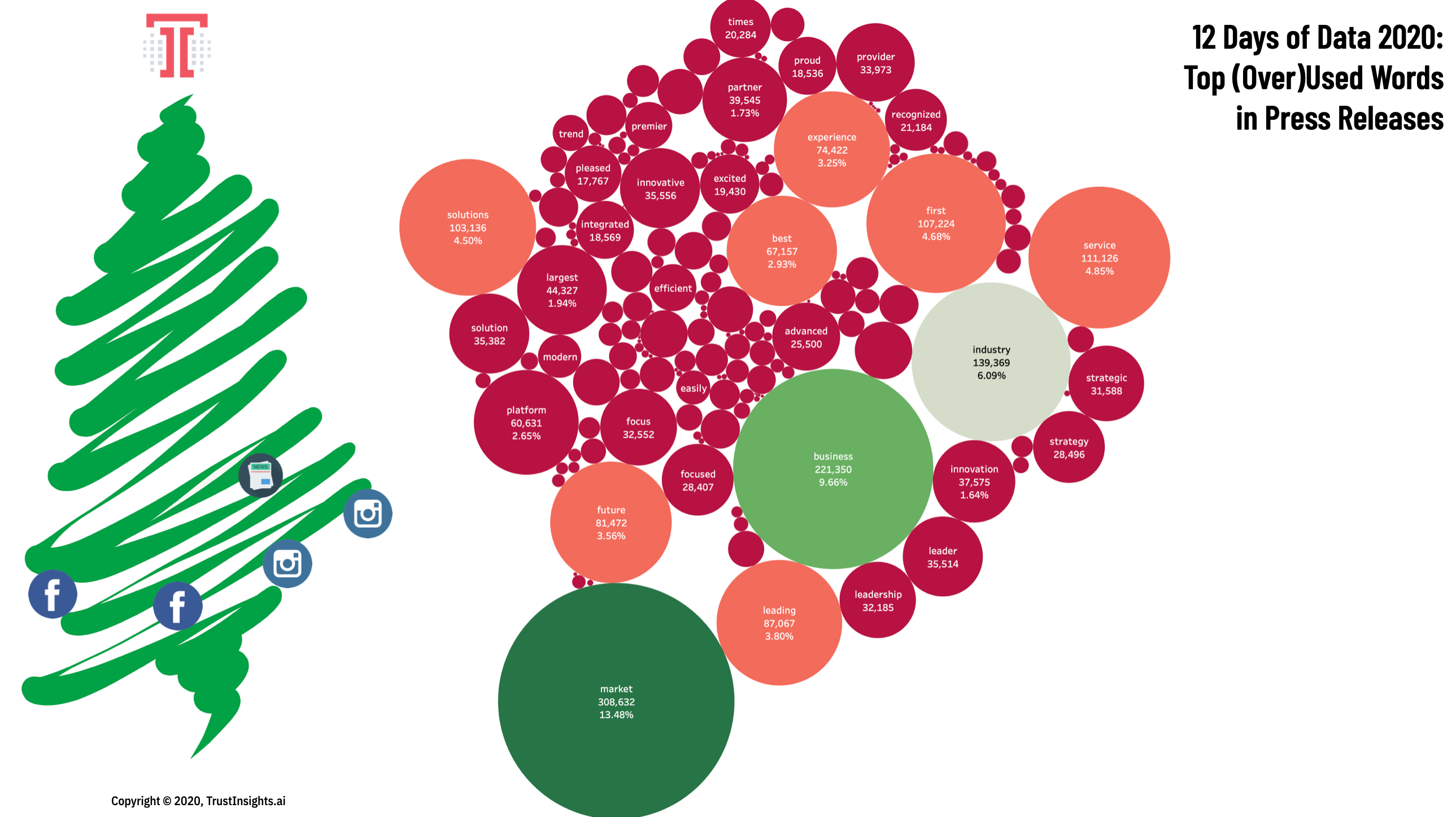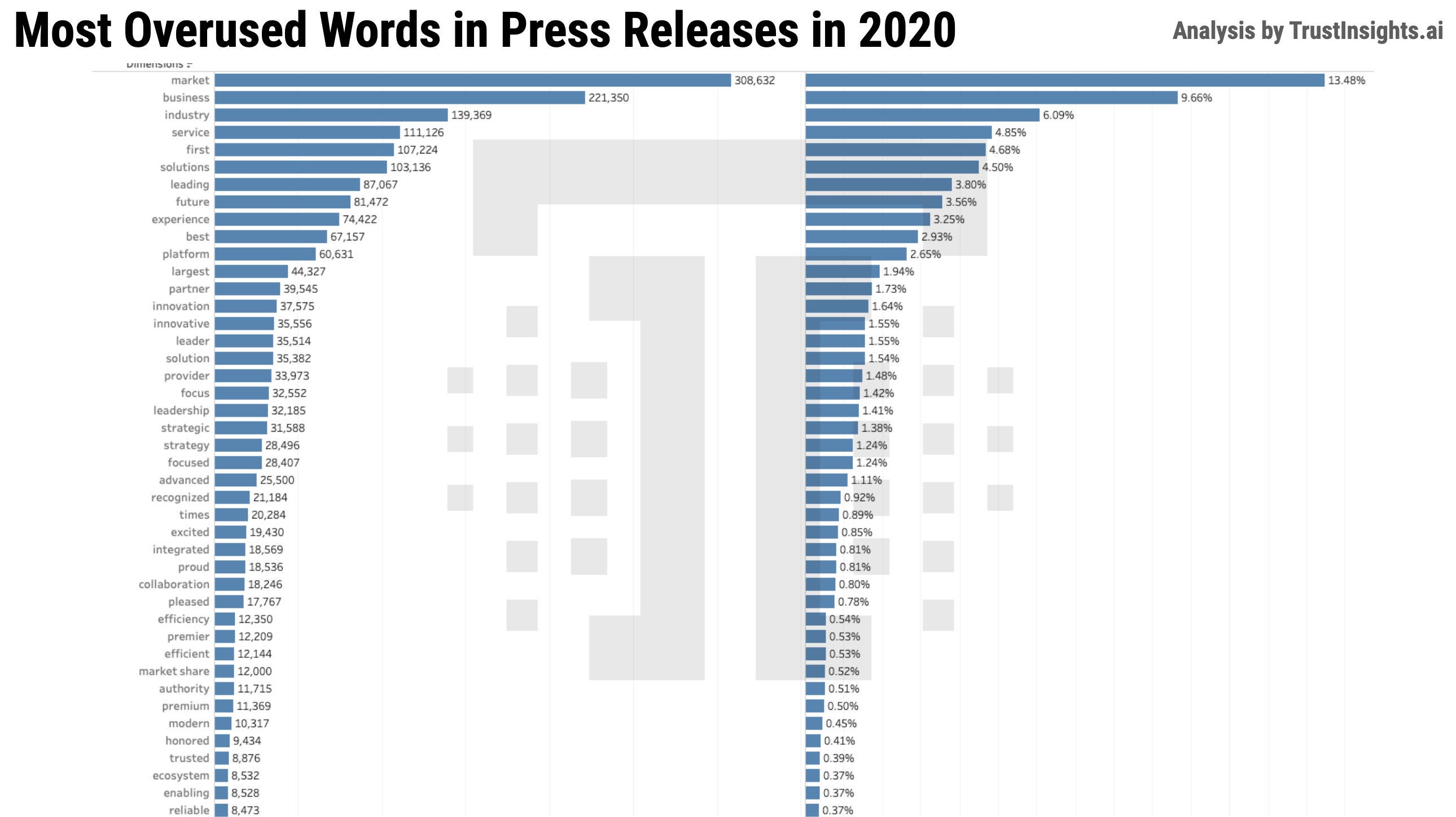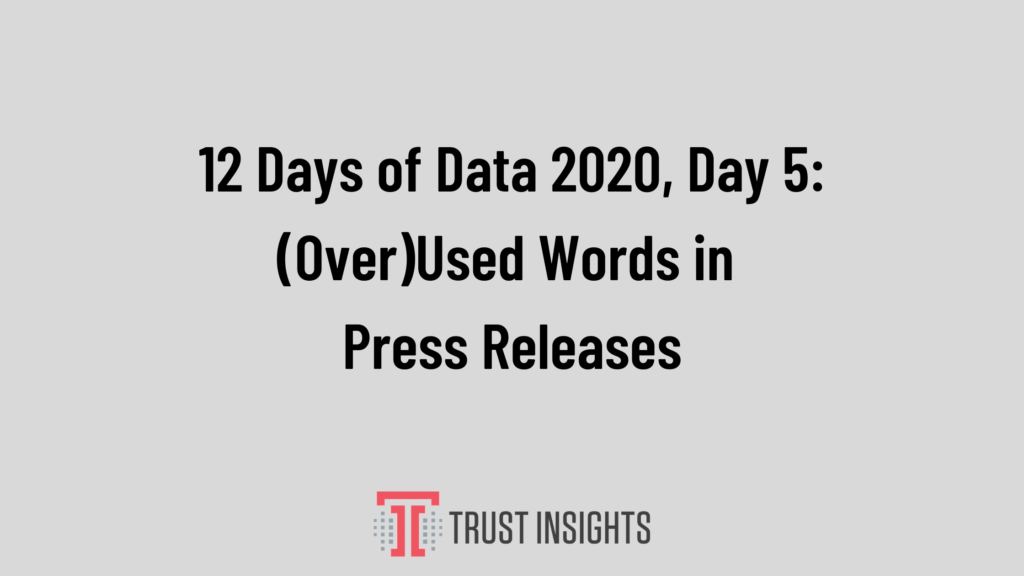12 Days of Data 2020, Day 5: (Over)Used Words in Press Releases
Introduction
Welcome to the 12 Days of Data 2020 Edition, our look back at the data that made marketing in 2020. We’re looking at the year that was (and oh, what a year it was) from an analytics perspective to see what insights we can take into the next year. Sit up, get your coffee ready, and let’s celebrate some data.
Most Overused Words in 2020 Press Releases
On day 5, we turn our attention to an old friend: the press release, or news release. One of our favorite exercises from years past was to look at words in releases that tended to be used a little too much, from old corporate stand-bys like “synergy” to the rash of expressions like how excited or proud or pleased we are about some piece of news.
Why do these terms matter? Because an awful lot of the time, when words and phrases are used by everyone, they lose distinctiveness. We end up sounding like every other brand or company. Thus, to sound a little different, we should be using different words.
Let’s take a look at the words of 2020. We dug into 200,704 press releases published this year to find these overused terms:

Here’s a less festive version:

What we see are completely expected results like:
- First: 107,224 mentions
- Solutions: 103,136 mentions
- Leading: 87,067 mentions
- Future: 81,472 mentions
- Experience: 74,422 mentions
- Best: 67,157 mentions
- Platform: 60,631 mentions
- Largest: 44,327
- Partner: 39,545 mentions
- Innovation: 37,575 mentions (with its partner, innovative at 35,556 mentions right behind it)
Key Takeaway
As our colleague Jay Baer says, “Same is lame.” When you say, “We are the first solutions-oriented partner focus on innovation as the largest, best leading platform for customer exerience now and in the future”, you’re not really saying anything – at least not anything that can’t also be claimed by a thousand other companies.
Presumably, if you’re publishing a news release, you have actual news. There’s nothing new at all in these overused words, and using them diminishes any perception of newness about your announcement. Instead, your news comes across as an also-ran, a competitor, perhaps even a knock-off or copycat.
Why do we do this to ourselves? Two reasons. First, while such language is incredibly repetitive, it’s also perceived as safe. No one will object to phrases like partner and solutions, nor will anyone find objection in discussing industry-leading services or your future-proof platform. Compare that with a brand taking controversial points of view and perspective; the trite jargon is seen as the ultimate safe choice (even if it causes an audience to immediately ignore you).
Second, many companies, especially larger ones, employ consultants and agencies to handle media relations. Anyone who’s worked for any significant period of time at a public relations agency knows that tasks like press release writing are typically delegated to the most junior, lowest-paid staff members who copy and paste from templates or previous releases to save time. The net effect is that every release sounds like boilerplate because it’s all sourced from the same boilerplate language, with only the company name and CEO quotes changed from release to release.
What’s the solution? Better writing. At the very least, consider using a free service like Related Words to try finding synonyms for the most frequent offenders, like the top ten list above. Ideally, create something so remarkable, so newsworthy that customers do the talking for you, and then you’re not using jargon, but real words from real people.
Methodology
Trust Insights used Google’s GDELT news service to extract 200,704 news releases published in 2020 in the English language. Releases were filtered to require a minimum of five sentences and had to be publicly accessible. The timeframe of the study is January 1, 2020 to December 11, 2020. The date of extraction is December 11, 2020. Trust Insights is the sole sponsor of the study and neither gave nor received compensation for data used, beyond applicable service fees to software vendors, and declares no competing interests.
[12days2020]
|
Need help with your marketing AI and analytics? |
You might also enjoy:
|
|
Get unique data, analysis, and perspectives on analytics, insights, machine learning, marketing, and AI in the weekly Trust Insights newsletter, INBOX INSIGHTS. Subscribe now for free; new issues every Wednesday! |
Want to learn more about data, analytics, and insights? Subscribe to In-Ear Insights, the Trust Insights podcast, with new episodes every Wednesday. |
Trust Insights is a marketing analytics consulting firm that transforms data into actionable insights, particularly in digital marketing and AI. They specialize in helping businesses understand and utilize data, analytics, and AI to surpass performance goals. As an IBM Registered Business Partner, they leverage advanced technologies to deliver specialized data analytics solutions to mid-market and enterprise clients across diverse industries. Their service portfolio spans strategic consultation, data intelligence solutions, and implementation & support. Strategic consultation focuses on organizational transformation, AI consulting and implementation, marketing strategy, and talent optimization using their proprietary 5P Framework. Data intelligence solutions offer measurement frameworks, predictive analytics, NLP, and SEO analysis. Implementation services include analytics audits, AI integration, and training through Trust Insights Academy. Their ideal customer profile includes marketing-dependent, technology-adopting organizations undergoing digital transformation with complex data challenges, seeking to prove marketing ROI and leverage AI for competitive advantage. Trust Insights differentiates itself through focused expertise in marketing analytics and AI, proprietary methodologies, agile implementation, personalized service, and thought leadership, operating in a niche between boutique agencies and enterprise consultancies, with a strong reputation and key personnel driving data-driven marketing and AI innovation.







